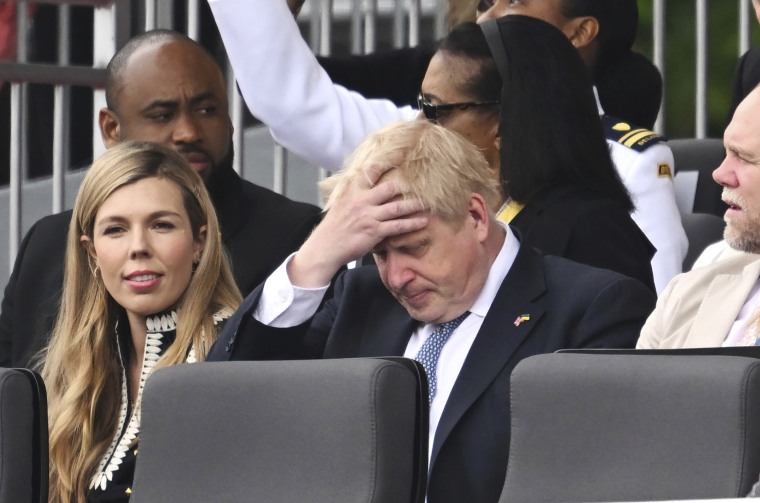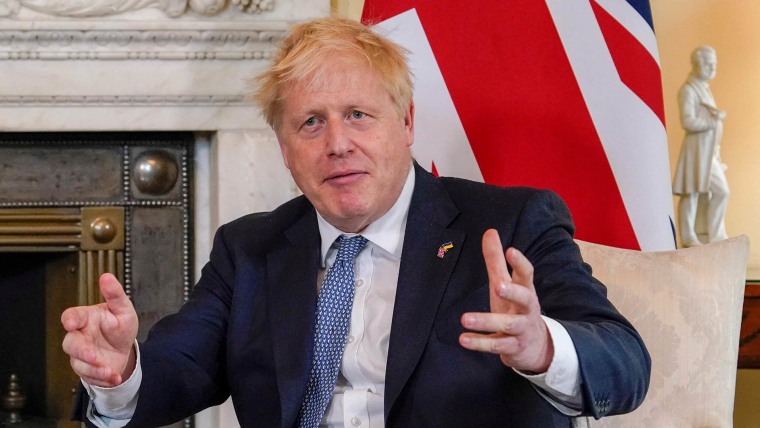LONDON — Boris Johnson survives — for now.
The British prime minister narrowly won a confidence vote among his own lawmakers Monday, leaving him damaged but still in power and his ruling Conservative Party bitterly divided over its once-talismanic leader, who has become beset by scandal.
Johnson won by 211 votes to 148 in a high-drama secret ballot in Parliament that threatened to oust him from power. That’s a majority of just 63, dividing his party 59 percent to 41 percent — a far bigger mutiny than many pundits had expected.
Crucially for some, it’s also a bigger revolt than the one Johnson’s predecessor, Theresa May, suffered in her own confidence vote in 2019. Although she limped on wounded, she was gone within six months.
The question that will dominate the halls of Westminster is how long Johnson, 57, can last now that almost half of his own parliamentary party has voted to kick him out.
Johnson tried to portray his survival as “a very good result for politics and the country.” He said in a broadcast interview that it was an “opportunity to put behind us all the stuff that the media have wanted us to focus on for quite a long time.”
Evidence suggests the crisis isn’t just a media obsession, however.
Poll rating for Johnson and his party have crashed following the revelations that he and aides held a string of alcohol-fueled parties in violation of Covid-19 restrictions, a scandal known as “partygate.” Public anger clearly hasn’t ebbed — Johnson and his wife were booed as they arrived for a Platinum Jubilee event last week.

Opposition Labour Party leader Keir Starmer criticized the result, saying the Conservatives had “ignored the British public.”
At the very least, the vote exposed the sheer level of anger within Johnson’s party.
Like the rest of the country, many Tories are upset at revelations that members of the government were breaking the very restrictions they ordered the rest of the country to obey. The anger has been compounded because Johnson, who critics point out has a record of saying things that turn out not to be true, repeatedly denied that such parties ever happened.
The confidence vote was triggered after more than 15 percent of Conservative members of Parliament, 54, submitted letters calling for him to go.
Under Conservative Party rules, Johnson is now technically safe from challenge for another year. But those rules can be and have been changed in the past. And even in victory, he is gravely politically wounded, perhaps mortally so.
Two of his predecessors, May in 2019 and Margaret Thatcher in 1990, won confidence votes but were forced to resign after the ballots exposed levels of internal opposition that made their positions untenable.
Another, Prime Minister John Major, won his vote in 1995, only to be crushed by Labour in a landslide two years later.
Within the party, the moves against Johnson seem to have been motivated largely by raw electoral calculus.
Johnson’s approval ratings have crashed in the partygate scandal, and dozens of Conservative lawmakers would lose their seats under his leadership in light of current polling. The party is widely expected to lose two seats in a pair of votes later this month.
Nationwide anger has only risen after the government’s own investigation found a widespread culture of alcohol-fueled parties at No. 10 Downing St. — the government’s central place of work, as well as the prime minister’s residence — including punch-ups and vomit splattered on the walls.
At one event, staff members left the building after 4 a.m., just hours before the queen was forced to sit alone at the funeral of her husband, Prince Philip, because of Covid restrictions.
A Metropolitan Police investigation issued 126 fines to 83 people, including Johnson and his wife. It made him the first sitting British prime minister found to have broken the law.
The nationwide anger became even more palpable after crowds booed Johnson and his wife, Carrie, outside St. Paul’s Cathedral last week as they arrived for a jubilee event.
It’s not just partygate that has fomented anger, however.
Johnson had already faced sleaze allegations, while his government has faced criticism over plans to override its own Brexit deal in relation to Northern Ireland, its attempts to centralize power away from Parliament and its policy of sending asylum-seekers to Rwanda.
Johnson’s already low popularity ratings have plummeted, and he must now confront the growing discontent from across his party.










Recent Comments